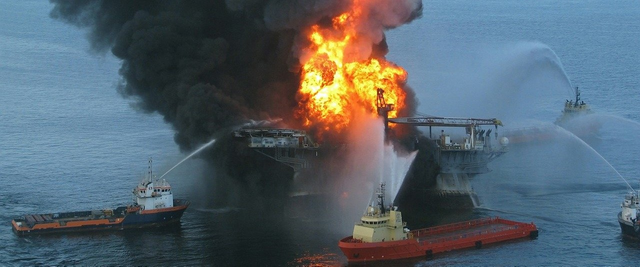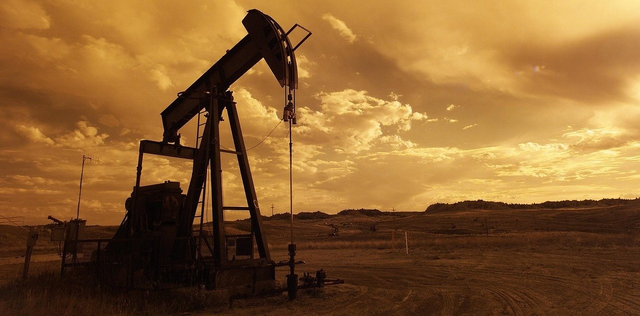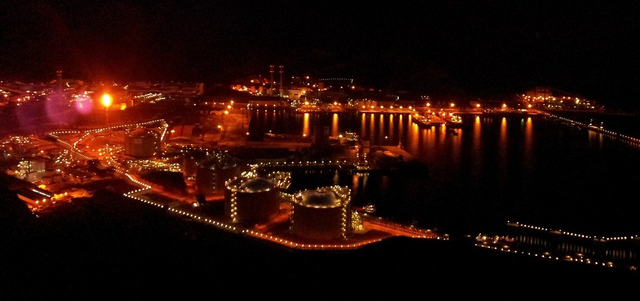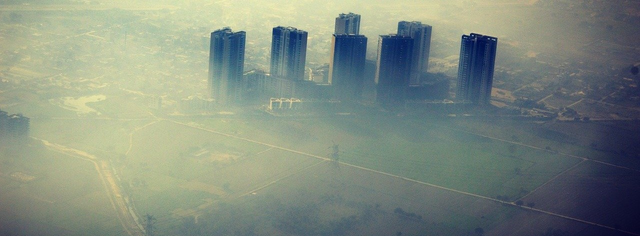Environmental Impacts #7 - Black Gold
Mother nature creates it over hundreds of millions of years. Humanity burns it in seconds. Its presence on Earth feeds our gluttony and greed, disguised as needs and necessities, in virtually every facet imaginable throughout our society. It is more coveted than gold whose possession will drive nations through the hells of war, welcome to the era of Black Gold.

Image by skeeze from Pixabay
Prologue
Ancient Babylonians

William Simpson (1823—1899) / Public domain
Babylonians, as early as 3000 B.C., utilized oil seeping from the ground for a multitude of activities. Builders used caulking for ships and mortar for building construction in their routine activities (BBC Teach). Forward to the Egyptians, as its use in even embalming practices is evident (BBC Teach). However, while the presence and application of oil in our ancient history may amaze us, it pales far in comparison to what we use oil for in our generation.
Introduction

Image by Robert Fotograf from Pixabay
Welcome, fellow Steemians, to our seventh installment of the Environmental Impact Series. During our series, we discuss how various elements on Earth impact our environment, lives, and society.
In this post, we will discuss oil and its processing and applications. Additionally, we will cover the impact of oil on the environment, and much more!
In our Environmental Impacts series, we discussed how various events or elements impact our environment. Environment Overview, volcanoes, mercury, wildfire, inferno, and climate change are topics we've covered in the past that continue to affect us today.
Join us now as we continue to the topic of oil, its production, and its application towards arguably everything we hold dear in society today.
What is Black Gold?

Image by skeeze from Pixabay
"Black goal" is the nickname for oil (Encyclopedia.com). When it comes out of the ground, it could be black as night. For those savvy enough to extract it in mass or distribute it to the highest paying customers, it brought massive wealth and fortune. Those in control of the oil supply, distribution, or refinement have a significant impact on our society today.
Brief Origin of Oil
Oil, as a fossil fuel, forms from the decay of organisms over millions of years as nature exposed them to the Earth's pressures and temperatures. Over time, the accumulation of fossil fuels within an area develops into deposits that can measure in the billions of barrels. The United States at the end of 2018, for instance, maintained oil reserves with a total amount of about 44 billion barrels of oil (Energy Information Administration).
The video above provides a bright and animated viewing of how our planet creates this influential and societally-addictive substance.
Extraction by Fracking
We covered facking in some detail when we discussed energy production with natural gas. The TedEd video linked above provides a more specific discussion on how fracking occurs.
If you don't have time to view the video, we can provide a brief written summary that also works to help you understand. A company that performs fracking will first drill several thousand feet below the ground and then divert the drill 90 degrees to drill horizontally about a kilometer (BBC). The drill forms small holes along the horizontal drill hole to create small cracks throughout the horizontal line.
The fracking company then pumps high-pressure water and select proprietary chemicals into the horizontal line. The special chemicals serve to dissolve minerals, release the oil from the surrounding rock, and disinfect the well to prevent the formation of bacteria. The process then extracts it for future processing and refinement.
The end products are sweet-sweet oil and toxic chemicals used to extract that oil. Handling the toxic chemicals after use is an exciting story.
Oil Processing & Refinement

Image by Fallofsaints from Pixabay
Before we discuss the almost innumerable ways we get products from oil, let's cover how we refine oil from its raw components into the different fuels. One process that creates different fuels is the distillation of petroleum. Let's discuss the overview of the process.
Craig Freudenrich, Ph.D., discusses distillation in his article "How Oil Refining Works". In a nutshell, we heat oil until it becomes a gas. We pump that gas through a large column and force it to pass through plates of varying sizes (Freudenrich). While the vapor cools, it condenses and becomes liquid that settles into the different levels of that large column. The resultant fluids within that column represent the different fuels that form.
The difficulty in the future processing of these fuels is dependent upon where they settled in the column. The higher up you are in the column, the less processing that's required. The video provided below presents an overview of the process we just discussed.
Disadvantages - Environmental Impacts

Image by ejaugsburg from Pixabay
If we change something in an ecosystem, we impact it. Regardless of how small the impact, we cause change occupying the space of our surroundings. When walking through a forest, for instance, we could displace branches, leaves, or build a campfire to keep warm at night. Hopefully, upon our departure, we recognize the impact we have made to ensure that we can restore the area as much to the original condition as possible.
Air Pollution
 Image by alvpics from Pixabay
Image by alvpics from PixabayThe main concern from fracking is the release of methane. If you can recall, methane is a greenhouse gas that is significantly more efficient at trapping sunlight within the atmosphere than carbon dioxide (Hoffman).
In the realm of oil refineries, greenhouse gases are not the only concern. Refineries can, and have, released toxic gases and carcinogens like benzene, toluene, and ethylbenzene (EPA). These gases don't just pose a hazard to our bodies. They also inhibit the formation of ozone in the atmosphere.
Water Pollution
 Image by analogicus from Pixabay
Image by analogicus from PixabayOne of my biggest fears of water pollution isn't just the contamination of water. It is the immense pushback communities receive from regulators on proving the cause of the contamination. Flint, Michigan, and Hinkley, California, are but two cities on this planet that experienced significant strife from regulators and private companies.
City residents want the problem to be corrected, and their medical issues resolved. Private companies and government regulators want the problem to go away. The government allows industries to proceed with activities almost under pretenses.
Fracking is no exception. Companies say that there can't be any water pollution because they drill so deep underground. Communities detecting fracking chemicals in their drinking water want the chemicals removed from their supply. Communities can't get the aid they need because the companies causing the fracking won't consider that they might be the cause of the contamination.
Advantages
Botany of Desire / Fossil Fuel of Desire
 Image by Rudy and Peter Skitterians from Pixabay
Image by Rudy and Peter Skitterians from PixabayThe author Michael Pollan wrote a book called "Botany of Desire" (Michael Pollan). In that book, Mr. Pollan writes about his belief that plants of all varieties induce us into admiring, planting, and spreading their seed. He provides some compelling examples. One of them compares the bumblebee to a human being. In this example, he says that, like a bumblebee, humans will help plants to pollinate, spread, and grow.
I wonder, sometimes, whether we are aware of our dependence on things—there is little to nothing we can do, for instance, about food and water. Our lives depend upon the continuous consumption of food and water. If we do not eat or drink water, we will die in short order. What about things that are not food and water?
Let's explore how invasive the use of oil-derived products are within our society. Perhaps then, we can understand how significant this fossil fuel is within our lives.
Invincibility
 Image by Michael Seibt from Pixabay
Image by Michael Seibt from PixabayThe oil and gas industry, in 2019, generated revenue in the trillions of dollars. Trillions. The juggernaut that is this industry seems to be invincible in that it can do what it wants with little to no repercussions if they should stray away from regulations. There seems to be little to no competition against them.
Versatility
 Image by cocoparisienne from Pixabay
Image by cocoparisienne from PixabayAny human, or non-human, increases their chance for survival by adapting to a situation. The same holds for corporations. In the case of the oil industry, it thrives and survives by tailoring its products to virtually every need advertised by society.
We use oil to create apparent things like fuel and lubrication for automobiles. Did you know that we need oil for renewable energy? Solar panels don't create themselves. What about medicine, medical equipment, clothing, and food? Did you know many of these areas require products derived from oil? Let's talk a little bit about the renewable, food, and transportation industries.
[Insert Here] Renewable Energy
We cannot create wind energy without oil. Oil is a necessary part of the turbine blade development. The machines that create the turbine blades require lubrication, and we get that through the use of oil. Delivering the parts for the wind turbine requires the use of transportation that depends on oil. We can say the same for other types of renewable energy production.
Food Industry
The food industry utilizes petroleum products to extend the shelf life of many foods (Petro News). Examples of some food using petroleum includes, but is not limited to: packaged baked goods, food colorings, and some chocolates (Petro News).
Transportation
 Image by RettungsgasseJETZTde from Pixabay
Image by RettungsgasseJETZTde from PixabayAccording to the Energy Information Administration, the United States consumes 69% of its petroleum in the transportation sector (EIA). Global statistics are less clear as there are no actual values for 2019. Values range from 25% global consumption for transportation in 2012 to 60% in 2018 as reported by Reuters.
It makes sense that the more significant portion of oil consumption goes to transportation. We need to transport materials from an origin to a destination. Everyone needs to move something somewhere. If we were going to target ANYTHING for a reduction in use, it should be automobiles. Our use of electric vehicles is increasing, but it's not enough to create an impact.
Environmental Summary
World Society, at this time, can't function without the oil industry. Our dependence on this versatile fossil fuel is such that we may not see a reduction in use during our lifetime for transportation alone. I can't see governments spending billions, perhaps trillions, creating a new infrastructure to move away from oil anytime soon.
The current end outcome is a society continuing to try and minimize environmental impacts from the oil and gas industry while trying to wean ourselves away from its dependence.
In Closing

Image by Gerd Altmann from Pixabay
Thanks again, fellow Steemians, for following on with this series. It's been a great ride, and I've appreciated all the reviews and votes from the Steem and STEM Communities.
Each topic presented poses different challenges during research. It is essential to cite all available references for this work to ensure that all readers can validate the information presented as they desire. The goal, ultimately, is the dissemination of accurate and thoughtful information. Unfortunately, some topics are more difficult to research than others.
Your thoughts?

Image by Free-Photos from Pixabay
What was your favorite article of this series? Is there anything else you'd like to see covered? Share your thoughts by entering your comments below!
Related Posts
| Volcanoes | Mercury | Wildfire | |
 |  |  |  |
| Inferno | Climate Change | Geothermal | Biomass |
 |  |  |  |
Congratulations @scholaris! You have completed the following achievement on the Steem blockchain and have been rewarded with new badge(s) :
You can view your badges on your Steem Board and compare to others on the Steem Ranking
If you no longer want to receive notifications, reply to this comment with the word
STOPTo support your work, I also upvoted your post!
A very good read. Lots of information, but an easy read and easy to understand.
Thanks for the compliment. These pieces pose the kind of challenge that forces you to watch how much you write. You could write books on these topics. It becomes engrossing once you start learning how these issues really work.
Thanks again!
Haha! Yes, one thing leads to another when you start investigating. It's all interconnected.
Great job condensing what could have been a really dreary and endlessly long read into something useful and thought-provoking.
From an eco perspective, I think almost no one talks about the massive damage the oil rigs and container ships etc do to the marine environment. How on earth would you even be able to begin to measure those effects??
Thanks for using the ecoTrain tag! There has been a change as we migrate ecoTrain to the communities system..
From now on please use the tag
hive-123046
as the first tag
OR
Post from our community page and then use any tags you like at:
https://steempeak.com/c/hive-123046
Then we can all see you and keep supporting your posts!

Keep up the great vlogging and inspiration..
With Love From ecoTrain
@artemislives
Thank you for your response and continued support.
We could measure impacts to the environment from oil rigs by first estimating what kinds of impacts it could cause. Next we develop metrics to measure the impacts and warnings to impacts we expect.
Over time, we would evaluate and adjust the metrics to be as realistic and accurate as possible. To top it off, you could have a public and utility group oversee this process and guide it to its best efficiency.
I know we can do this because I work in Nuclear Power and these behaviors are required by law. At the onset of Nuclear no one had a clue what to do and I imagine it’s similar for any industry that doesn’t look ahead too far.
My readings, however, show me that the industry is improving in its response towards minimizing its impacts on the environment. One program that has support is the rigs to reef program. When a well is dry the crew cleans up the rig and tips it over forming an artificial reef. The process is long but it is hopeful.
scholaris, you've just received an upvote of 100% by delegationvoter!
Learn how I will upvote each and every one of your posts
Check out today's daily report detailing my current upvote power and how much I'm currently upvoting.
This bot is open source.
Clone it from github
Get help installing and running this bot
great read! thanks for sharing!
Thank you for the compliment and support. Our next article will be on smartphone and tablets. The piece focuses on how their use impact the environment. Stay tuned!
Excellent article, many points debate. I think that oil is another natural resource on our planet, and that like other resources must be exploited rationally, and to consider the idea of not exploiting it we must change our lifestyle, since everything we demand requires this resource . For me the secret is to cover the principles of rationality and sustainability, since if the exploitation of oil is carried out in a rational way, I believe that we can provide the existence of both this resource and the survival of our planet to future generations.
Hydraulic fracturing or fraking is a secondary recovery method that contemplates the idea of recovering oil from unconventional deposits, however its environmental impact lies in the chemicals applied to make the fluid that is injected into the formation to increase the porosity of the rock that is what happens with the conventional oil fields.
Greetings @scholaris and thanks for sharing this good article.
@carlos84
Thank you for your response and support! Oil is certainly one of those resources we cannot currently avoid using. We have to be very careful to ensure we understand it’s effects and take what precautions are necessary to prevent cross contamination of our water supplies. I hope regulatory agencies keep in mind that we need to take care of the environment as well as our GDP. It does seem as if they are improving on a larger scale with that concept.
Our next article will deal with smartphone and other smart technology. We will observe the costs of production against the environment and our society. Stay tuned!
I think oil is amazing, it literally propelled society out of poverty and in to the modern comfortable world we have today! It's too bad governments are using fear mongering tactics to control the population and implement a tyrannical socialist/communist agenda. The sheep are being lead in to a trap. The so called woke are Sleeping sheep.
Oil is amazing. Its composition alone allows it the industry to process it into virtually anything we need is mind-boggling. I can't speak too well of government fear-mongering tactics, but there is a hint of some form of control someone is using to keep us on oil.
One documentary I watched reported that electric cars were around since the 1900s. We had electric vehicles in the form of taxies. Why wouldn't we have pursued that venture to our current day? I can't imagine how the world would be if we never stopped using electric vehicles.
This post has been voted on by the SteemSTEM curation team and voting trail. It is elligible for support from @curie and @minnowbooster.
If you appreciate the work we are doing, then consider supporting our witness @stem.witness. Additional witness support to the curie witness would be appreciated as well.
For additional information please join us on the SteemSTEM discord and to get to know the rest of the community!
Thanks for having included @steemstem in the list of beneficiaries of this post. This granted you a stronger support from SteemSTEM. Note that using the steemstem.io app could have yielded an even more important support.